|
|
|
Sort Order |
|
|
|
Items / Page
|
|
|
|
|
|
|
| Srl | Item |
| 1 |
ID:
066780
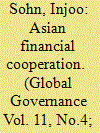

|
|
|
| 2 |
ID:
098783
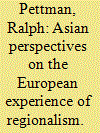

|
|
|
|
|
| Publication |
2010.
|
| Summary/Abstract |
How have European state-makers managed to coordinate various key activities to the point where many of them see the European Union as providing a model for the rest of the world in general and Asia in particular? For example, most of Europe now shares a common market and a common currency. This was originally considered unthinkable. However, most European state-makers did surrender significant aspects of their sovereign power to make this happen. State-makers in the Asian region have not yet followed suit. This tells us something about their competing politico-strategic, economic and social concerns. Asian state-makers are nonetheless capable of sustaining their own form of regionalism. This tells us something about the different politico-cultural context in which they live. This context makes it possible to promote distinctly 'Asian' perspectives. It provides an Asian alternative to European regionalism and a way of compensating for the limits and distortions of the European Union.
|
|
|
|
|
|
|
|
|
|
|
|
|
|
|
|
| 3 |
ID:
089515
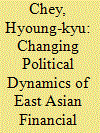

|
|
|
|
|
| Publication |
2009.
|
| Summary/Abstract |
This paper analyzes the factors that have contributed to the development of the Chiang Mai Initiative, one of the prominent examples of recent East Asian financial cooperation, by comparing it with the failed 1997 proposal for an Asian Monetary Fund
|
|
|
|
|
|
|
|
|
|
|
|
|
|
|
|
| 4 |
ID:
097127


|
|
|
|
|
| Publication |
2010.
|
| Summary/Abstract |
The article challenges the view that democratisation is a recipe for regional disorder in East Asia. This view is not supported by evidence. Critics of democratisation fail to consider a number of mitigating factors that may check the destabilising consequences of democratisation while accentuating its peace-causing effects. These factors are not necessarily other liberal forces, like economic interdependence, or regional institutions, although these do matter. Certain dynamics associated with democratisation, such as focus on economic rebuilding for regime legitimation, positive nationalism ('democratic pride'), involvement of civil society, etc., may lessen the potential for inter-state conflict. These mitigating factors do not necessarily correspond with the normative and institutionalist logic underpinning the democratic peace theory, and they have been largely overlooked by the critics of that theory. After identifying them, this paper shows that the East Asian experience does not show that democratisation leads to greater conflict between states. On the contrary, democratisation might create better prospects for cooperative peace in the region.
|
|
|
|
|
|
|
|
|
|
|
|
|
|
|
|
| 5 |
ID:
103248


|
|
|
|
|
| Publication |
2011.
|
| Summary/Abstract |
While an interactive relationship between scholars and policymakers is generally regarded as mutually beneficial, there is also the risk of 'entrapment.' The latter occurs when scholars, once having proven their usefulness to policymakers and thereby earned their trust, become unwilling to offer dissenting opinions for the fear of risking their access and privileges. Using Asian regionalism as an example, this article argues that the development of regional institutions in Asia has benefitted from the ideas and input of the two main channels of such scholar-official interaction: epistemic communities and track two dialogues, especially during the formative stages of Asian regionalism (both economic and security). But after gaining access, scholars engaged with officialdom in developing regional institutions have found it difficult to dissent from the official line, and in challenging the shortcomings and failures of Asian regional institutions. In Asia, the danger of entrapment has been strong in authoritarian countries. In general, participation by Asian scholars in the policymaking process has suffered from the inability of scholars and think-tankers (especially the latter) to rise above the national interest and question the official position of their own governments, the ubiquitous presence and dominance of government-linked scholars or retired government officials in track two dialogues, the exclusion of social movements form many such dialogues, the presence and influence of non-specialists (in issue areas) in setting their agenda and outcome, and generational gatekeeping (failure to bring in new faces). As a result, the development of a genuine transnational regionalism has been stunted.
|
|
|
|
|
|
|
|
|
|
|
|
|
|
|
|
| 6 |
ID:
131828
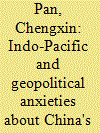

|
|
|
|
|
| Publication |
2014.
|
| Summary/Abstract |
The Indo-Pacific seems to have come of age. In a growing body of literature on this subject, the rise of India and China, as well as the ensuing great-power competition and deepening economic links across the Asia-Pacific and the Indian Ocean regions are often seen as mere (albeit new) geopolitical realities, which the term 'Indo-Pacific' can best capture. This article, however, questions the 'naturalness' of the 'Indo-Pacific' and illustrates how it is largely a product of geopolitical imaginations about the perceived 'rise of China'-imaginations that are shared among some influential observers and practitioners, particularly in the USA, Australia, Japan and India. Fuelled by their collective anxieties about China's growing influence in Asia, the 'Indo-Pacific' is not an innocent or neutral description, but is a manufactured super-region designed to hedge against a perceived Sino-centric regional order. In doing so, it is complicit in the production of great-power rivalries and regional security dilemmas. It is thus important that the 'Indo-Pacific' construct be subject to critical re-examination and re-imagination.
|
|
|
|
|
|
|
|
|
|
|
|
|
|
|
|
| 7 |
ID:
150257


|
|
|
| 8 |
ID:
098871
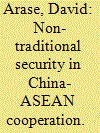

|
|
|
|
|
| Publication |
2010.
|
| Summary/Abstract |
The institutionalization of China-ASEAN non-traditional security cooperation is underappreciated, even though its significance should be apparent to Western analysts. Appreciating China-ASEAN non-traditional security cooperation leads to the realization that it has strategic significance, and that the broader China-ASEAN multilateral process is the most institutionally developed expression of East Asian regionalism today.
|
|
|
|
|
|
|
|
|
|
|
|
|
|
|
|
| 9 |
ID:
133785
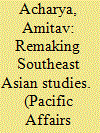

|
|
|
|
|
| Publication |
2014.
|
| Summary/Abstract |
Southeast Asian studies faces multiple challenges, such as misgivings among its scholars regarding the field's geopolitical lineage, skepticism about the relevance of Area Studies in an era of globalization, and the rise of competing discipline-based approaches. But these challenges also provide the impetus for rethinking and broadening, especially through a closer engagement with disciplinary approaches and comparative studies. To this end, this paper highlights two possibilities: "transnational Area Studies" and "disciplinary regional studies." Together, they attest to the "promise of comparisons." Using examples such as the discourse on "Mediterranean analogy" in Southeast Asian historiography and the study of Southeast Asian regionalism by international relations scholars, this paper argues that comparisons need to go beyond analogies that do little more than serve as a self-vindicating "comfort zone" for the scholar. Also, comparisons can be enhanced by studying the processes and consequences of diffusion, not in the sense of establishing the universal validity of certain ideas and institutions, but of exploring their localization and contribution to diversity. Comparisons should not privilege an ideal type on the basis of which "others" are studied and judged. Citing the danger of Eurocentrism in comparing Southeast Asia with the Mediterranean, and ASEAN with the European Union, the paper argues that comparisons should recognize the significance of each case in terms of its own context. Such comparisons do not invoke a "spectre," but offer the promise of broadening Southeast Asian Studies to overcome the lingering doubts about the future of the field
|
|
|
|
|
|
|
|
|
|
|
|
|
|
|
|
| 10 |
ID:
082236
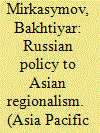

|
|
|
| 11 |
ID:
133786
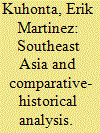

|
|
|
|
|
| Publication |
2014.
|
| Summary/Abstract |
This article seeks to assess the contributions and key characteristics of comparative-historical analysis in the field of Southeast Asian studies. It does so by examining three specific issues that emerge from this methodological genre: the conceptualization of the region of Southeast Asia, the role of theory, and the emphasis on macro structural ontology. These issues are analyzed in three disciplines: political science, history, and anthropology. The article shows that dialogue among comparative-historical researchers is most evident within the disciplines of political science and history. In anthropology, important comparative-historical work has also been produced but it has been less engaged within the comparative-historical canon. In reviewing these three disciplines' shared analytical concerns as well as contributions to comparative-historical analysis, the article makes an implicit case for greater interdisciplinary engagement across the disciplines.
|
|
|
|
|
|
|
|
|
|
|
|
|
|
|
|
| 12 |
ID:
155088


|
|
|
|
|
| Summary/Abstract |
The study of international relations in or of Asia is no longer atheoretical, as was the case only three decades ago, when the Pacific Review was founded. But how serious are the efforts to study the international relations of Asia theoretically? Some Western scholars argue that writings on Asian International Relations (IR) are still peripheral to the major concerns and debates among IR theories such as realism, liberalism, and constructivism. The ‘indigenization’ of Asian IR theory remains limited by, among other factors, a tendency among local scholars to rely heavily on Western theories, and the close academia-officialdom nexus in the region that inhibits theoretical work. But this essay argues that Asia offers an opportunity to IR theory for broadening itself and shed its hitherto Westerncentrism, especially at a time of a ‘global’ turn in IR (global IR). Theoretical writings on Asian IR are already making a difference by exposing the limitations of mainstream IR theories in the regional context. And they have the potential to offer new and alternative concepts that are more contextually grounded and relevant for Global IR. At the same time, there remain some important conditions that must be met before theoretical writings on Asian IR can make further progress and realize their full potential.
|
|
|
|
|
|
|
|
|
|
|
|
|
|
|
|
|
|
|
|
|